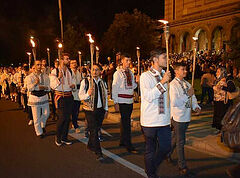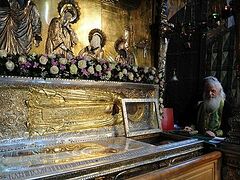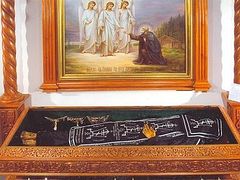Lemaire, Loire Valley Region, France, July 25, 2022
Since his repose in 1940, the remains of His Eminence Archbishop Theophan of Poltava, known as the New Recluse, have lain in the municipal cemetery of the small settlement of Lemaire in the French Loire Vally Region.
But on Thursday, July 21, the process of the reburial of his remains in Russia, his homeland, where he once served as confessor of the Royal Martyrs, began. The hierarch’s remains were exhumed that morning, and His Eminence Archbishop Nestor of Madrid and Lisbon served a panikhida, reports the Korsun Diocese.
The exhumation and service were attended by the local mayor and clerics and faithful who specially arrived in France for the occasion.
The same day, the Archbishop’s remains were sent to St. Petersburg, where they will be interred at the Volkovo Cemetery.
***
The future Archbishop Theophan was born into a priest family in the St. Petersburg Governorate in 1874.
He studied at the theological school at the St. Alexander Nevsky Lavra, then the St. Petersburg Theological Seminary and Academy. He was tonsured as a monk with the name of Theophan in 1898. He was ordained a hierodeacon and hieromonk later that same year.
In 1901, Fr. Theophan was elevated to the rank of archimandrite and appointed as the Academy’s acting inspector. He received his master’s in theology in 1905. He also had the opportunity to meet Tsar Nicholas that year, after which he was appointed the Royal Family’s spiritual father.
In February 1909, he became rector of the St. Petersburg Theological Academy, and later that month, he was consecrated as a bishop at the St. Alexander Nevsky Lavra. The next year, he was appointed to the Diocese of Taurida, though he was moved to the Astrakhan Diocese in 1912, where he was remembered for his rare asceticism, simplicity and accessibility, and complete disregard for his material well-being. His house became a haven for the poor, who received all necessary assistance. However, he also contracted malaria there, and his pre-existing tuberculosis worsened.
In 1913, he was transferred to Poltava, where he remained until after the terrible 1917 revolution. In 1918, he was elevated to the rank of archbishop. In November 1920, together with other southern bishops, he accepted the sorrowful lot of exile.
He went to Constantinople, then Yugoslavia, Bulgaria, and finally France, where he retired to seclusion, living a hermit’s life in caves, where he could devote himself entirely to prayer. He reposed in the Lord in 1940.
Read more about Abp. Theophan in the article, “A Crowned Wrestler.”
Follow OrthoChristian on Twitter, Vkontakte, Telegram, WhatsApp, MeWe, and Gab!






